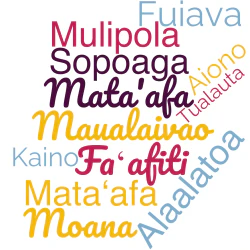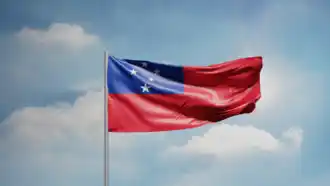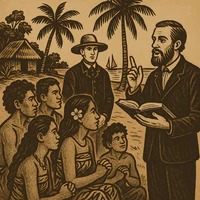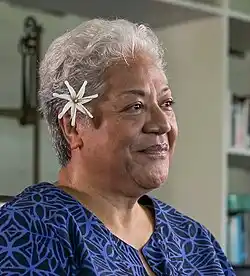
Samoan surnames are a blend of indigenous traditions and foreign influences. Traditionally they often denoted family, place or personal status. These naming practices and meanings remain significant in Samoan culture, but today many Samoans carry surnames of foreign origin. The blending with or replacement of traditional Samoan names with foreign surnames reflects the multiple influences on Samoa's history and development.
A brief history of SamoaA brief history of Samoa
Samoa covers a group of islands located in the central Pacific Ocean, about halfway between Hawaii and New Zealand.
Samoa’s history can be traced back more than 3,000 years ago with the arrival of Lapita settlers, a prehistoric Austronesian seafaring people who settled many islands in Melanesia and Western Polynesia. Over the following centuries Samoa became a cultural hub in the Pacific, closely linked to Tonga and Fiji. European contact began in 1722, followed by the arrival of Christian missionaries in the 1830s. Rivalries among local chiefs and colonial powers led to a series of civil wars. In 1899 Samoa was partitioned between rival colonial powers. Germany took western group of islands, Western Samoa, while the United States took the eastern group of islands, which was named American Samoa.
New Zealand assumed control of Western Samoa after the First World War. A local movement achieved independence in 1962, the first Pacific island nation to do so. In 1997, this new country officially dropped “Western” from its name, being simply known from then on as Samoa. American Samoa remains an unincorporated territory of the United States[1].
History and traditional conventions of Samoan namesHistory and traditional conventions of Samoan names

Matai (chiefly) titles are of particular importance in the history of Samoan names. These were much more than the source of the names of Samoan chiefs or leaders. They were a core part of the system known as Fa‘amatai, the cornerstone of traditional Samoan social, political, and familial life[2]. Matai titles often reflected ancestral achievements, village origins or the natural environment. The titles were passed down through generations and could be shared among family members, though only one person held a particular title at a time.
Surnames were not used in traditional Samoan society, rather individuals were identified by a given names. Surnames only began to appear and be used after first contacts with foreigners and especially after European colonial administrative control. The introduction of Western-style surnames frequently reflected patronymic (using the father's first name as a surname) and toponymic (based on place of origin or habitation) naming conventions[3].
Many Samoans today have surnames of English, German, Chinese, Swedish or Danish origin[4]. These are the result of inward migration, intermarriage between foreign arrivals and the native populations and practical responses to colonial administrative pressures. Some Samoan surnames are now written or pronounced differently to fit colonial administrative systems or for ease of use in modern society. For example a traditional name such as Fa’amausili becomes Faamausili.
Western Samoan (now simply Samoan) and American Samoan surnames still share deep cultural roots. But over time they have diverged due to their different historical, political and linguistic experiences[5]:
In Western Samoa surnames are:
- Frequently based on ancestral roles, social status or noble/leadership connections.
- Often reflect family lineage, place of birth or other regional association.
- Influenced by Western naming conventions.
- More often rely on the use of patronymic or traditional single names in daily life.
- Are often fluid, changing over a lifetime for example to honour significant achievements or events. They might include the acquisition of new matai (chiefly) titles.
In American Samoa surnames are[6]:
- Strongly influenced by U.S. administrative requirements, so have tended to become more fixed for the purposes of clarifying land rights and social hierarchy.
- Sometimes combined or blended foreign-origin names with traditional names to reflect the person's European, Asian, or American origins. This hybridisation is more common in American Samoa than in other neighbouring Polynesian societies.
- "Formalised" versions of day-to-day names when used in official documents, in education settings or to meet modern travel requirements.
Influence of Christianity on the development of Samoan namesInfluence of Christianity on the development of Samoan names

As already noted during the 19th and 20th centuries Christian missionaries and colonial administrators encouraged the adoption of Western-style surnames for administrative, religious, and social purposes.
The spread of Christianity also brought new types of names into Samoan society. Upon their conversion and baptism many Samoans began to use biblical names or names with religious significance alongside traditional Samoan names[7].
Types of Samoan surnamesTypes of Samoan surnames
There are different types of Samoan surnames:[8]
Samoan surnames of toponymic originSamoan surnames of toponymic origin
- Tualauta - "western lands," indicating a geographical connection
- Vaiala, Mauga - examples of Toponymic surnames, derived from village or place names
- Anae - derived from "ana" (cave) and "e" (of), suggesting a family's connection to a specific cave
- Moana - "sea," a name closely tied to Polynesian identity
Samoan surnames of descriptive originSamoan surnames of descriptive origin
- Faumuina - "to be blessed," signifying prosperity
- Folau - "to travel" or "to sail," reflecting a history of exploration or seafaring
- Galea'i - "to be victorious" or "to triumph," reflecting resilience or victory
- Malo - "to be strong," "to be brave," or "to be powerful," signifying strength and leadership
- Matalasi - "the strong one" or "the warrior," suggesting bravery and resilience
- Maualaivao - from "maua" (to get) and "alaivao" (the high mountain), indicating overcoming obstacles or authority
- Moa - "chicken," possibly linked to raising chickens or as a symbol of fertility
- Natia - "hidden treasure or secret," unique and poetic
- Samaria - "a good Samaritan" or "sacred," with biblical connotations
Samoan surnames of occupational originSamoan surnames of occupational origin
- Aiono - "chief," denoting a high-ranking individual
- Satele - "leader," denoting leadership qualities
- Apelu - from "pelu," meaning "to cover," possibly signifying protectors of land
- Asiata - from "Asi" (to bring), indicating a role as traders or bringers of new knowledge
- Fuiava - from "fui" (to follow) and "ava" (kava), possibly indicating a connection to kava traditions
- Moliga - from "liga" (to join/unite), suggesting a role in uniting communities
- Mele - "song," reflecting a musical heritage
Celebrities of Samoan originCelebrities of Samoan origin

Samoan surnames are represented across sports, entertainment, politics and the arts. Relative to its small population several Samoan individuals have achieved international prominence:
Sports, Entertainment & Music
- Anoaʻi Family is a famous Samoan families in professional wrestling, with members like Roman Reigns, Rikishi, Yokozuna, The Wild Samoans (Afa and Sika), The Usos (Jey and Jimmy Uso), Umaga, and others. Dwayne "The Rock" Johnson, though known by his stage name, is also connected to this extended family through his maternal lineage.
- Evelina Afoa is a record-holding Olympic swimmer.
- Vili Ala’alatoa and his (Australian-born) son, Allan, are prominent international rugby players.
- Tumua Anae, Hawaiin-born to Samoan parents, is an Olympic gold medallist in water polo.
- Keneti James Fitzgerald Apa, better known as KJ Apa is a well-known actor, recognised for his role in the TV series Riverdale. New Zealand-born Apa's father was the matai of his Samoan village.
- Neil Ieremia is a renowned choreographer and the founder, artistic director and chief executive of contemporary dance company, Black Grace.
- Demetrius C. Savelio, best known by his stage name Savage, is a successful rapper and singer.
- Teuila Blakely is a Samoan actress recognised for her roles in film and television.
- Monica Galetti (née Faʻafiti) is a well-known chef and television personality in the UK.
Politics, Arts & Academia
- Fiame Naomi Mata'afa is Samoa's current (2025) and first female Prime Minister.
- Albert Wendt is a highly respected Samoan writer and academic.
See alsoSee also
Explore more about Samoan surnamesExplore more about Samoan surnames
You can research family history, including possible Samoan connections, easily and instantly through the [Samoa - Collection Catalog] at MyHeritage. Apart from records pertaining to Samoa, it provides access to a huge global collection of almost 36 billion historical records across multiple databases as many additional resources such as feature articles and guides.
For more specific research on Samoan surnames you can try other specialty online sources, such as:
- Research your Samoan surname at MyHeritage
- Forebears.io: lists over 2,700 unique Samoan surnames with frequency data.
- Surnam.es: explores origins and meanings of common Samoan surnames.
- Kidadl.com: includes details of 100 common Samoan surnames and their meanings.
- NamesFlare.com: lists common Samoan surnames and explores traditional naming practices In Samoa.
References
- ↑ BBC. (2018, January 23). Samoa Profile - Timeline. BBC News.
- ↑ Wikimedia Foundation. (2025, June 23). Faʻamatai. Wikipedia.
- ↑ Pier. (n.d.). Samoan - naming. Cultural Atlas.
- ↑ Pai, R. (2025a, June 3). 135 top Samoan last names or surnames, with meanings. MomJunction.
- ↑ FamilySearch Wiki. (2022, December 14). Samoa (Western and American).
- ↑ Most common American Samoan surnames & meanings. (n.d.).
- ↑ FamilySearch Wiki. (2020, May 6). Learn the history and customs of your culture.
- ↑ Samoan last names and meanings. FamilyEducation. (2024, August 14).

